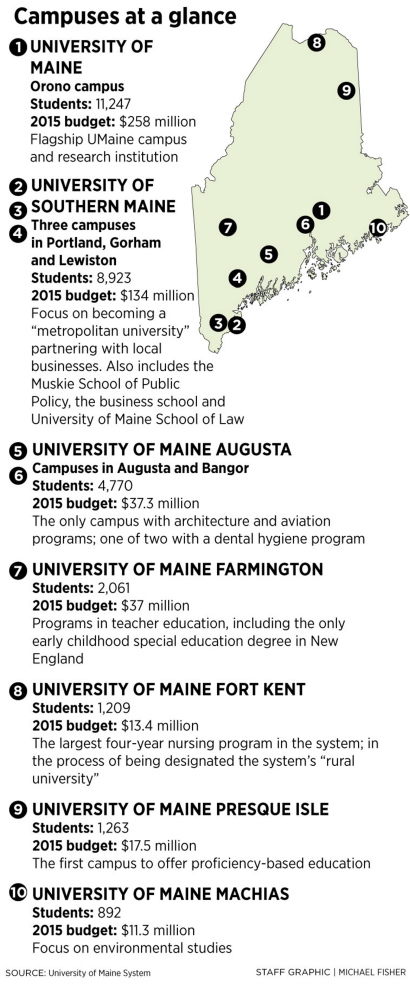Each university in the University of Maine System must stake out a distinctive campus identity to complement an overall vision of UMS offering a “portfolio” of academic offerings. Each campus has undertaken a strategic plan to hone its identity, and the work is ongoing. A more complete description of each campus identity is available online at pressherald.com.
• The Flagship: University of Maine
Orono will continue as the flagship UMS campus and research institution. It has 90 undergraduate majors and academic programs, 70 master’s degree programs, 35 doctoral programs, a business school and the Honors College. It also houses the Cooperative Extension program, the system’s only NCAA Division I athletics program and does research in areas including renewable energy, biofuels, sustainability and climate change, and agricultural, environmental, and marine sciences.
•The Metropolitan University: University of Southern Maine
USM is beginning the process of defining its vision as a “metropolitan university,” described broadly as a campus with increased partnerships with local businesses and agencies. USM has three campuses, and offers more than 100 undergraduate majors and academic programs, 23 master’s degree programs, four doctoral programs, the Muskie School of Public Policy and a business school. The University of Maine Law School is housed on the USM campus.
• Serving Adult Learners: University of Maine at Augusta
Augusta is carving out an emphasis on educating adult learners, which make up over 70 percent of the current student body. Students are focused academically on career-oriented fields in business, social services, computer informational services and health care. Augusta has the only architecture and aviation programs in the system, and one of two dental hygiene programs in the state. The campus is also heavily committed to distance learning, with over a third of its students taking classes online or at one of the school’s eight University College centers. It has the largest percentage of veterans in the student body, and is noted as a “Military Friendly School” by GI Jobs and a “Best for Vets” choice by Military Times. Overall, about 50 percent of students are in Augusta, 20 percent in Bangor and 30 percent are educated through the University College centers, which are smaller, leased offices with limited staff.
• Public Liberal Arts and Education: University of Maine at Farmington
Farmington, with 30 bachelor’s degrees and two master’s programs, will build on its identity as a public liberal arts college with noteworthy programs in teacher education, including the only early childhood special-education degree in New England.
• The Rural University: University of Maine at Fort Kent
Fort Kent is carving out an identity as the system’s “Rural University,” aimed at serving students in rural areas with academic programming focused on career preparation. The campus has the largest four-year nursing program in the system, and has partnered with more than 35 Maine high schools to offer early college programming that allows high school students to graduate with up to a full year’s worth of college credit. The university teams have won four national championships in small-college athletics since 2010.
• Proficiency-based Education: University of Maine at Presque Isle
Presque Isle, which offers 28 liberal arts and professional programs, is the first UMS campus to offer proficiency-based education, beginning in the fall. This is a major transition, which requires students to show mastery of a particular subject before moving forward. Officials say this allows students to learn at their own pace, and synchronizes the university with the new proficiency-based learning in Maine’s high schools.
• Environmental Liberal Arts: University of Maine at Machias
The campus is honing its six-year-old academic focus on “environmental liberal arts” and exploring a deeper emphasis on environmental studies that tap into the current interest in the environment and community sustainability. Academic offerings include programs in marine biology, environmental recreation and tourism, and includes “The Maine Coastal Odyssey,” a four-seminar course taken by all UMM students over a four-year period.
Send questions/comments to the editors.




Success. Please wait for the page to reload. If the page does not reload within 5 seconds, please refresh the page.
Enter your email and password to access comments.
Hi, to comment on stories you must . This profile is in addition to your subscription and website login.
Already have a commenting profile? .
Invalid username/password.
Please check your email to confirm and complete your registration.
Only subscribers are eligible to post comments. Please subscribe or login first for digital access. Here’s why.
Use the form below to reset your password. When you've submitted your account email, we will send an email with a reset code.